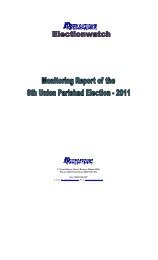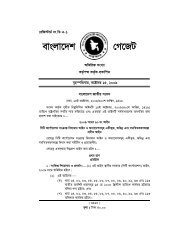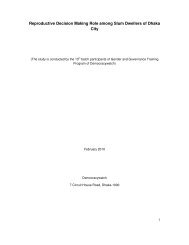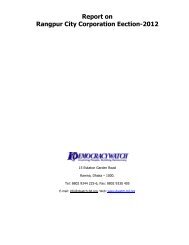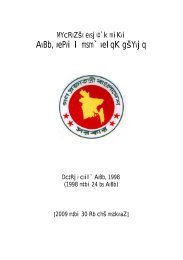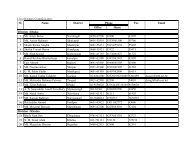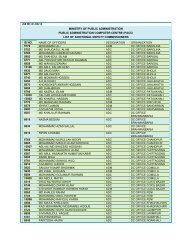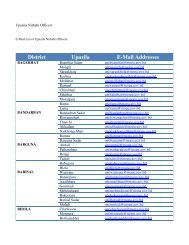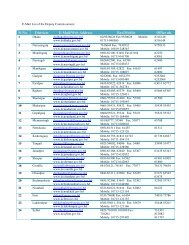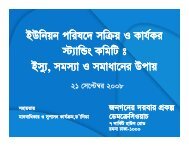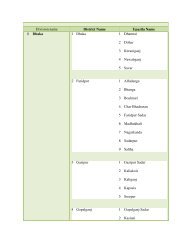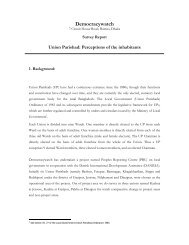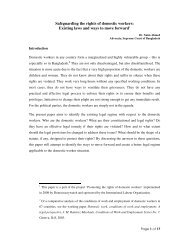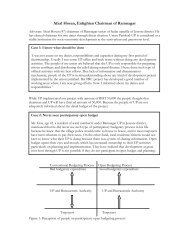Annual Report 2009-10 - Democracywatch
Annual Report 2009-10 - Democracywatch
Annual Report 2009-10 - Democracywatch
Create successful ePaper yourself
Turn your PDF publications into a flip-book with our unique Google optimized e-Paper software.
ANNUAL REPORT<strong>2009</strong>-20<strong>10</strong>
DEMOCRACYWATCH ANNUAL REPORT <strong>2009</strong>-20<strong>10</strong>FOREWORDI have the honour and proud privilege of presenting the <strong>Annual</strong><strong>Report</strong> for the year <strong>2009</strong> -<strong>10</strong> as the Chair of the Board ofGovernors of <strong>Democracywatch</strong> for the current session. Whilegetting through the activities of the organization, I really wonderhow it could spread its wings over such a vast area covering andcaring for the rural and urban problems; exploring the potentialsand possibilities especially among of the young women and men. Ihave my deep appreciation for the efficient energetic young staffwho put all their efforts to implement the target scheduled at grassroot levels including domestic workers and professionals likemembers of BUPF and MAB.The Executive Director of <strong>Democracywatch</strong> has her owninnovative idea and initiates steps to promote and improve theposition of local government and thereby uplift the social structuretowards establishing good governance and ensure and exercisetheir human rights. To achieve this objective the focus is given tospecial training for building leadership skill equally among menand women. With no exaggeration my appreciation goes for thisparticular activity along with other in the ever growing canvas of<strong>Democracywatch</strong>.I believe, all our development partners are doing their best toachieve the same to bring a change in our country's developmenthistory and achieve the desired goal of involving people andbuilding Democracy.I wish them all the success.Latifa AkandaChairpersonCONTENT<strong>Democracywatch</strong> & Identity 1Executive Summary 1Human RightsGender Resource Centre 3Promote the Rights of Domestic Workers 5Transparency for Human Rights Project 6Democracy & GovernancePeoples <strong>Report</strong>ing Centre (PRC) 7USAID Progati Project <strong>10</strong>Working Towards Ensuring Free and Fair Election 13Training<strong>Democracywatch</strong> Education 15Programs for Kids 16Leaders of Influence Program 17Youth Leadership Program 18NGO Support Services 19Library<strong>Democracywatch</strong> Library 20Finance & ManagementManagement <strong>Report</strong> at a Glance 21Financial Analysis 22AnnexPublications 24GLOSSARYADR : Alternative Dispute ResolutionASK : Ain-O- Salish KindroA WWR : Alliance For Women Workers RightsBILS : Bangladesh Institute of Labour StudiesBYLC : Bangladesh Youth Leadership CouncilCAPT A : Citizens Alliance for Promoting Transparency and AccountabilityCBO : Community Based OrganizationDW : Democracy watchEWG : Election Working GroupESU : English Speaking UnionGGSP : Gender and Government Sensitization ProgramHRGG : Human Rights and Good GovernanceI0M: International Organization for MigrationJSC: Junior School CertificateLOI: Leaders of InfluenceNGO: Non Government OrganizationNNCJ: National Network for Concerned JournalistsNSS: NGO Support ServicePNGO : Partner NGOPROW : Promote the Rights of Domestic WorkersPSU: Programme Support UnitRMMRU : Refugee and Migration Movement Research UnitRI : Relief International .SAP-BD : South Asian Partnership-BangladeshSSS: Swapno Shahajyo SangsthaSUS: Samajik Unnoyon SangsthaTHR: Transparency for human RihthsUNDEF : United Nations Democracy FundUP: Union ParishadUZ: UpazillaVGD: Vulnerable Group FeedingYLP: Youth Leadership Programme
<strong>Democracywatch</strong> is an independentnon-profit, non-partisan, nongovernmentorganization with a visionto establish a truly democratic cultureand value and create consciouscitizens who will be the champion ofgood governance monitor humanrights and ensure freedom ofexpression.Executive SummaryA N N U A L R E P O R T 2 0 0 9 - 2 0 1 0<strong>Democracywatch</strong> emerged as a trust in1995 and became a registered NGOwith the NGO Affairs Bureau in 1997.Since then we endeavored to fulfill ourobjectives which are as follows:I. Strengthening national and localgovernment institutions forensuring good governance throughmaking them accountable,transparent and pro-people.2. Establish democratic culture andpractice to protect and respecthuman rights of all peopleirrespective of sex religion,ethnicity and creed.3. Sensitize media on human rightsissues through training andmonitoring of its violations andproject freedom of expression,4. Develop youth and womenleadership qualities through lifeskills and lifestyle training andraising awareness aboutdemocratic values.5. Ensure free and fair electoralprocess through civic and votereducation for electing the rightrepresentative.6. Eradicate poverty by creatingenabling environment for equalopportunities to quality livelihood.This year we concentrated on ourfield work with the localgovernment, with the grass rootpeople and small local NGOs.While working with the localNGOs, both DW and the PNGOsrealized the need for the latter’sconcept of Good Governance andHuman Rights, FinancialManagement Capacity. Thus werevived the training of local NGOsas our own initiative. We areproud to say that there has beentremendous response to this andthis year we offered two trainingsevery month. Moreover, we couldalso arrange dormitory facilitieswith full board for sixteenparticipants. This year we haverefurbished our two existing hallsand increased facilities for ourown and others use.As I mentioned before that mostof our project work was devotedto the local area especially underPRC project. We held more openbudgets in the 28 targeted UPs,encouraged more collaborationbetween citizens, UPs andGovernment officials throughCitizen’s Committees,strengthened the StandingCommittees on health, education,agriculture and finance andensured more initiatives by theUPs to increase their resources.Through their activities we wereable to kindle hope among boththe UP and the grass rootspeople. These activities of ourscreated so much interest that thenearby UPs also wanted oursupport for improving theirservices.PRC project funded by DANIDA’sHRGG unit will end next year andwe are consolidating our effort tosustain the work throughstrengthening Citizen’sCommittees which alreadyexperienced people power inushering in change.USAID funded and DAI supportedPROGATI’s budget training andcampaign work in the selectedareas went very well this year.Training on Budget analysis andinitiating public vigil on corruptionwas participated by many civilsociety members from differentareas, who concentrated on beingactive and aware citizens inbringing the corruption element infocus of people in their respectiveareas. We achieved success inmonitoring public service deliveryespecially in
Barumchora union in Anwara upazillawhich improved their service deliveryto people. We are glad that theprogramme will continue for anotheryear which will provide us with theopportunity for more deepeningactivities.Gender Resource Center issuccessfully implementing DanishEmbassy funded GGSP programme.The students of this trainingprogramme conducted someelection observers through organizingtraining sessions.We are very proud to announce thatwe gave special attention to ourmanagement system both financialand administrative this year; thereputed audit firm Qasem and Copresented us with a highlyprofessional manual. We appreciatethe support of DAI in this respect.DW also started to train journalistsgreat support to us in this innovativework.All these programs except a fewnational level advocacy ones gaveopportunity to most of my colleaguesto be with the grass- roots levelpeople. Our understanding of theirproblems and issues to address hasgiven us the necessary tools withwhich we wish to undertake morework for enlightening and motivatingthe grass-roots people, strengtheningNew Features in <strong>Democracywatch</strong>DormitoryTraining RoomA well furnished 16 beddormitory has beenopened this year withall meal facilities. It isopen for all NGOs fortraining purposes atreasonable fees.A well equipped Training Room at <strong>Democracywatch</strong> opened in September 20<strong>10</strong>. It is on the 2 nd floorof its annex building. The large hall is spacious enough to accommodate 20 trainees. An additionalgroup of <strong>10</strong> can be seated, if required. The venue has generator support and other features likeprojector; OHP, big screen, sound system etc. can also be rented at a nominal charge.The training room can be rented from early morning till 8 pm. Meals can either be catered by<strong>Democracywatch</strong> or may be brought in from outside. Support staffs are available with an extra charge.important surveys among the urbanslum areas which created a lot ofinterest. A very successful GenderFair was held which brought togethermany NGOs working in this field.Interest in this very special traininghas increased among the graduatesand aspirant development workers.DW is a member of 31 NGO groupcalled EWG. It elected a SteeringCommittee in <strong>2009</strong> with a view tosustain it as a trained andprofessional election observationbody. I have the pleasure to share mydelight in being elected as one of thethree Co Chairs of EWG. Last year Ihad the opportunity of attending NDIsponsored international workshop onelection observation held in Colombo,which looked at developing a perfectobservation reporting form.DW observed the by-elections andChittagong City Corporation electionas mobile observers. Although EWGis supported by TAF we undertookthese elections with our ownresources. We are also developingour partner NGOs’ capacity asgroups both local and urban onTransparency and Human Rights inpartnership with Relief International.This is an European Union supportedprogramme.For the first time DW worked withdomestic workers to make themaware of their rights and alsosensitized the employers on theirduties towards them. This ILOsupported small initiative gave usmuch insight into the plight of theurban domestic workers and the needto do more for ensuring their humanrights.Our renowned Life skill and Life styleprogram for creating young leaders iscontinuing. We have included specialcourses for women, especiallyhousewives to provide them thecapacity for attaining economicindependence.Our LOI project is a very successfulone which has brought togethermostly young people from all walks oflife to make commitment to work forthe society. Again TAF has been athe local government and thusdeveloping Bangladesh.Lastly I would like to thank all ourcolleagues, field workers, partners,UP chairmen, members, governmentauthorities, our board members andnone the less our donors for providingus the support which gave us theopportunity to accomplish our dutiesto the people to ensure their humanrights and help develop goodgovernance for creating a liberaldemocratic society.Thank youTaleya RehmanExecutive Director
Gender Resource CentreVisionWomen leadership brings changes inthe status of women in political, socialand economic sphere.Objectives• Conduct Gender and GovernanceSensitization Program for Womenand men for creating social leadersfor establishing an equitablesociety and to sensitize thecitizens on gender issues,especially the future generation.• Ensure rights of poor andmarginalized women and childrenby raising awareness about health,early marriage, dowry and violenceagainst women.• Conduct various surveys on statusof women in the political, socialand economic spheres forestablishing equal rights.• Join in advocacy and campaignnetwork at the national level tostrengthen policy reform.StakeholdersPrimary StakeholdersUniversity Graduates, YoungProfessionals, Developmentsactivists, Slum Dwellers, DomesticWorkers and their employers,Children, Social Science ResearchCouncil.Secondary StakeholdersPolicy makers and implementers,Civil Society groups, Academia,Development organizations,Marginalized women and children,health workers, Ministry of Womenand Child Affairs and Ministry ofLabour.Activities• Developed training manual withdetailed course curriculum forGender training.• Conducted 4 trainings for youngprofessionals on Gender andGovernance Sensitisation Programfor Youths funded by Royal DanishEmbassy• Provided Internship in differentdevelopment organizations suchas, Ain O Salish Kendra,• Organized various dayobservances such as: InternationalWomen’s Day, International Dayfor the elimination of Violence againstWomen, International HumanRights Day etc.• Conducted surveys on1. A study on Sales Girls ofDhaka City2. Study on the Children of Drop-In- Center of Dhaka City3. Reproductive Decision makingRole among the Slum Dwellers ofDhaka City4. Health Problems of Womenliving in Slums: A situation analysisof three selected Slums of DhakaCity.• Conducted survey on Expansion ofCell Phone and BehaviouralChange in InterpersonalCommunication funded by SocialScience Research Council.Achievements• Among 60 participants of the fourbatches of 50 participantscompleted Gender andGovernance Training among which35 were female participants.Among them 50% are employed inANNUAL REPORT <strong>2009</strong>-20<strong>10</strong>human rightsGender Budgeting Seminar, 20<strong>10</strong>3
ANNUAL REPORT <strong>2009</strong>-20<strong>10</strong>human rightsdifferent organizations such as TIB,Ain O Salish Kendra, teachingprofession and in banks &corporate bodies. 3 participantscompleted their internship in<strong>Democracywatch</strong>.• A Gender Fair had been organizedto promote gender issues amongthe stakeholders. The objective ofthe Fair was to promote genderissues and share materialsdeveloped by differentorganizations working towardsgender equality, human rights andgood governance. The Fairtargeted the policy makers,planners, civil society, media andother concerned groups and youngprofessionals to create awarenessin this regard.Challenges• Since the resource persons arenationally acclaimed personalitiesand they are occupied in variousnational and international activities,some time sequence of programschedule can not be maintained.• It was challenging to arrangeschedule for the participants fromdifferent background. Participantsof Gender Resource Center aremostly students and affiliated todifferent educational institutions.They are simultaneously involvedin GGSP training course andacademic education in theirrespective universities. As suchcourse schedule had to beadjusted with their examination,assignment etc. Accordingly, itbecomes a challenge for us toprepare their training schedule,including participation in researchand internship.Future Plans• Regular Gender and GovernanceTraining• Capacity Building of Governmentand NGO Partners on Gender andChild issue• In depth Survey and Advocacy onMaternal Health issue.• To Work on the Maternal Health ofUrban Slum dwellers.• Start a Street Children’s Drop InCenter.Engendering DemocraticGovernance inSouth Asia<strong>Democracywatch</strong> is the memberof National Level Watch Groupof SAP Bangladesh. NationalLevel Watch Group is a part of aproject titled EngenderingDemocratic Governance inSouth Asia funded by UnitedNations Democracy Fund(UNDEF). The Watch groupworks to observe, review andanalyze women’s politicalparticipation and violenceagainst women in politics.<strong>Democracywatch</strong> continuouslyworks with SAP-BD and SAPI.As a part of that<strong>Democracywatch</strong> conducted astudy titled Representationand Violence AgainstWomen in Politics inBangladesh. Moreover, Ms.Taleya Rehman, ExecutiveDirector <strong>Democracywatch</strong>presented paper on ViolenceAgainst Women inPolitics at anInternational conferenceheld in Srilanka.Alliance for WomenWorkers Rights(AWWR)Formed a platform for promotingwomen workers rights and equalemployment opportunitiesnamed Alliance for WomenWorkers Rights (AWWR)supported by ILO. As member ofthe AAWR Steering Committee,Ms. Taleya Rehman presented apaper on Gender Equality andSexual Harassment atWorkplace: Policy and LegalStructurePhtos: Celebrating <strong>10</strong>0th Anniversary of International Women's Day4
Promote the Rights of Domestic Workers<strong>Democracywatch</strong> implemented a pilotproject (September <strong>2009</strong>- January20<strong>10</strong>) named¡ Promote the Rights ofDomestic Workers¡–(PRDW) with thesupport of International Labour Office(ILO). In continuation of this projectDW implemented second phase ofthe project which started in April 01,20<strong>10</strong> and completed in June 30,20<strong>10</strong>.Objectives• To collect opinions regarding rolesand responsibilities and rights ofthe domestic workers mentioned inthe code of conduct of someresidence of selected apartmentcomplex of Dhaka City.• To know the present situation ofdomestic workers and createawareness regarding their rights.• To share the problemsencountered by both the domesticworkers and their employers.• Policy advocacy to incorporatedomestic workers agenda inexisting labor law.• To promote the formation of aformal Code of Conduct for welfareof domestic workers.Activities• Develop a pilot initiative todisseminate information on issuesof domestic workers for thegrassroots families which are oneof the major sources of domesticworkers.• Apart from dissemination ofinformation on their labor rights,the project introduced amongdomestic workers some importantissues i.e. how to manage theirwork situation, orientation onemployee and employerrelationship, bargainingetc.Organized meeting to createawareness among differentstakeholders to ensure their rights.• Engaged local elected bodies suchas Union Parishad (UP) for publicawareness campaigns.• Target UPs maintained a registerof migrant domestic workers oftheir constituencies.• Carried out a national level policyadvocacy program to incorporaterights of domestic workers in theLabor Law.• Published material (newsletter,brochure, leaflet, poster, journaletc) on domestic workers rightsand disseminate among thedomestic workers, their employers,policymakers, governmentofficials etc.Achievements• Formed four Special Committeeswith seven members in eachcommittee to deal with the issuesof domestic workers on four UnionParishads: Purba Chatnai UnionParishad and Goyabari UnionParishad of Dimla Upazilla inNilphamari district and SingraUnion Parishad and Palsha UnionParishad of Ghoraghat Upazilla inDinajpur district.• 3603 people including parents ofdomestic workers of <strong>10</strong>8 villages offour selected Union parishadsattended in <strong>10</strong>9 yard meetings andraised their awareness ondomestic workers rights.• A total of 889 domestic workersPhotos: Workshop and Seminar on Rights of Domestic Workerswere registered in four project UPsof Nilphamari and Dinajpurdistricts.• 167 domestic workers and 55employers sensitized on Code ofConduct to monitor the condition ofdomestic workers.• A National level policy dialoguewas held on domestic workersrights, existing law and future workstrategy Law makers, Lawyers,Human Rights workers, Socialworkers, Researchers and mediapeople discussed on the issue tofind out a better way of solutionand made recommendations.ChallengesLimited fund and time constraintswere the main challengesFuture PlansTo work more intensely withDomestics Workers Rights Network.ANNUAL REPORT <strong>2009</strong>-20<strong>10</strong>human rights5
Transparency for Human Rights ProjectANNUAL REPORT <strong>2009</strong>-20<strong>10</strong>human rightsThe Transparency for Human Rights(THR) programme of<strong>Democracywatch</strong> is in progress inpartnership with Relief International(RI) supported by European Union.The synopsis of the program is totrain and organize mediaprofessionals and media outlets sothat they have the power to defendfreedom of expression and advocatefor respect for human rights at thenational level through coalitions withother rights defenders and opinionmakers.Goal• Improved media skills andprofessional development of ruraland local journalist versed withmodern communicationtechnologies to disseminatehuman rights violation issue moreeffectively.Objectives• To strengthen the capacity of themedia as a promoter of HumanRights through the establishmentand capacity building of a nationalnetwork of journalists• To raise awareness of HumanRights violations among civilsociety community and peoplethrough a constructive dialogueabout promoting Human Rights• To introduce modern technologiesfor efficient reporting of HumanRights violations both at home andabroadActivities• Curriculum on the Media andHuman Rights• Professional DevelopmentWorkshop on the Media andHuman Rights• Establishment of National Networkof Concerned Journalist ( NNCJ)• Capacity Building of NationalNetwork of Concerned Journalist(NNCJ)• Peer training on reportingpertaining to Human Rights• Rural linkage initiative• Media monitoring of print media• Development and dissemination ofmedia materials• Arrange Radio Talk ShowAchievementsStronger capacity of mediaprofessionals to defend the right tofree expression, increased publicaccess to information, increasedProfessional Development Workshop on HRpublic awareness and created publicpressure for human rights, forimprovement in the human rightsrecord of Bangladesh government.Future Plan<strong>Democracywatch</strong> will build up anationwide platform of journalists onHuman Rights issue, who will act as acatalyst to ensure Human Rights.Target Beneficiaries• Media Professionals• Opinion makers,• Educators and youths• Local Government and CivilSociety representatives in 20districts.THR workshop on Manual Development6
7democracy & governancePeoples <strong>Report</strong>ing Centre (PRC)About PRCPeople’s <strong>Report</strong>ing Centre (PRC) hasbeen functioning since March 2006 inorder to create an enabling conditionfor the disadvantaged people so thatthey gain access to better servicesconcerning health, education,agriculture and local disputeresolution. Moreover, it aims toensure people’s participation inbudgeting, planning, implementationand monitoring of UP activities andget people’s organizations such asCitizen Committees, Civil SocietyOrganizations (CSOs) andCommunity Based Organization(CBOs) involved in theimplementation process and playwatchdog role. The projectcontributes towards establishing anaccountable and transparent UnionParishad in the project areas.Furthermore, it identifies gapsbetween policies and itsimplementation and advocates forreform.VisionStrengthening Partnership betweenpeople and local elected bodies forbetter management of UnionParishad in Bangladesh.Objectives• Poor and disadvantaged peopleare enjoying access to better serviceson health, education, agricultureand alternative dispute resolution.• Involve Citizens Committees,General people, CSO, CBOs inbudgeting, planning,implementation and monitoring UPactivities• Greater constituency at both localand national level on accountableand transparent LGI• Improve Institutional capacity of<strong>Democracywatch</strong> staff and PartnerNGOs to implement the projectStakeholders• Elected UP representatives (bothmale and female)• Local community people• Citizens groups• Standing Committee members• Other organizations, involved indifferent activities• Local journalists and elites• Victims of Human Rights violation• Govt. Officials at various levels(UP,UZ, District)• PolicymakersActivities• Assist target UPs to form standingAwareness Campaign Gazipurcommittees on health, education,agriculture and law & order.• Provide capacity support to the UPstanding committee members,officials on ADR, human rights,participatory planning, budgetingprocess and monitoring of servicedelivery.• Organize workshops, coordinationmeetings with the Union HealthWorkers, Block Supervisors ofAgriculture Department, ThanaEducation Officer on developingand monitoring the management ofpublic services delivery to the poorand disadvantaged people.• Facilitate the formation of CitizenCommittees, ( Ward level, <strong>10</strong>-12members)• Organize trainings, workshops,exposure visit, experience sharingmeetings.• Mobilize public opinion, bycampaigns, and publications forawarness raising.ANNUAL REPORT <strong>2009</strong>-20<strong>10</strong>Coordination Meeting, DinajpurYard Meeting, Dinajpur
LEB workshop, Gazipurnational level.• Facilitate policy analysis, researchand review (Documentation ofgood practices).• Support the popular movement infavor of a pro-poor policy issue.• Arrange exposure visits to learnfrom the best practices of effectivelocal government institutions.• Over eighty local disputes on land,early marriage, dowry anddomestic violence against womenhave been resolved. This indicatesthat deprived people had greateraccess to justice.• PRC advocated for a number ofreform recommendations on UPAct <strong>2009</strong>, gender and social safetynet to the policymakers.ANNUAL REPORT <strong>2009</strong>-20<strong>10</strong>Monthly Meeting, DinajpurLEB workshop, Jessore• Conduct regular monitoring of UPfunctions, citizens engagement,service delivery and accountabilityand transparency of LEBs.• Organize and conduct trainings forDW and PNGO staff.Achievements duringthe period• Enhanced participation of localpeople in UP planning and budgetpreparation.• Union Parishad has become moretransparent as they are disclosingtheir annual income, expenditureand allocation to their constituents.Future plans• Promote best practices so thatPRC participatory approaches arereplicated by other UPs.• Based on PRC experiences, a newproject is being planned throughwhich PRC intends to bring microlevel issues at macro level andlobby for reform.Locations15 UPs of Jessore sadar, 5 UPs ofDimla upazila in Nilphamari, 4 UPs ofGhoraghat in Dinajpur and 4 UPs ofGazipur sadar.democracy & governanceMid term review session• Assist UPs to conduct pre-budgetand open budget sessions.• Develop advocacy strategy.• Organize public hearing /debate/seminar/workshop at local and• Health, education and agricultureservice delivery bodies andgovernment employees are moreaccountable through citizenscommittee monitoring.• Citizens committees haveemerged as a bridge betweenelected representatives,government officials and localcommunity.Development PartnerHRGG-PSU, DanidaPRC is implemented incooperation with local NGOs.They are, Swapno SahajjyoShangstha (SSS), Jessore; SamajikUnnyon Shangstha (SUS), Gazipur;Nilachal, Nilphamari; and PRADIP,Dinajpur.Advocacy Program, DhakaNational level Advocacy Program, Dhaka8
case studyLucky was rescued from dowryLucky(23) lives in a village called Kashimpur. She got married to Kamal Uddin(27) from nearby village, Kazipur of Ramnagar Union. Kamal’s family wassolvent enough owning land and livestock. Kamal knew Lucky and they werehaving a relationship before marriage. Their dream came true through marriagein 2007. Unfortunately, Kamal along with his family members began to behavestrangely with Lucky. Kamal started irritating and misbehaving with his belovedwife. He started to return home at mid-night and torture her.Lucky realized her mistakes but it was too late. Lucky became pregnant whichmakes a woman proud and happy. She was tolerating all the repressions,thinking of her child. One day Kamal demanded 20,000/– taka from Lucky andasked her to bring it from her father’s house. Lucky’s in-laws became cruel andincreased the level of torture as she disagreed with the proposal. Lucky wasforcefully driven away from her husband’s house. Lucky returned to her father’shouse at Kashimpur. Lucky’s parents could do nothing but to cry and worry.Lucky shared her experiences with a relative named Taizel. Taizel was amember of Citizen Committee of Peoples’ <strong>Report</strong>ing Center (PRC). He knewabout Alternative Dispute Resolution (ADR) as well as village court throughvarious orientation and capacity building programs of PRC. It was hard for Taizelas an enlightened citizen to accept such heinous incident. Taizel discussed withseveral members of advisory board named Akram, Jalil, Samad and Hazrat Ali.They, along with Lucky, came to ward member Mr. Liakat Ali. In November 28,<strong>2009</strong>, through a long discussion, an allegation was filed on the issue. Taking theallegation into immediate account with significance, the UP Chairman Mr. AyubHossain and others summoned both the parties. Standing in Court, Kamalconfessed the charges against him. It was decided and declared in the opencourt that Lucky should not be tortured, dowry should not be demanded andKamal must maintain his wife, kid and family. On December 9, Kamal took backhis wife in his family.ANNUAL REPORT <strong>2009</strong>-20<strong>10</strong>democracy & governance9
USAID PROGATI ProjectANNUAL REPORT <strong>2009</strong>-20<strong>10</strong>democracy & governanceVisionEstablish principles of accountability,transparency and responsiveness todecrease the level of corruption toensure development.Objectives• To raise awareness among masspeople against corruption and howit hinders development• Mobilization of civil society to actas watchdog against corruption• Building trust and confidencebetween civil society andgovernment• Building capacity of civil society toinfluence decisions in nationalbudget development.Stakeholders• Civil society groups• Government• CitizensActivitiesRaising Citizens Awarenessabout CorruptionSince 2008 <strong>Democracywatch</strong> hasbeen implementing this project in 8districts under Chittagong, Barisaland Rajshahi division. Under thisproject the organization coordinatesin forming and mobilizing civil societygroups countrywide.During July <strong>2009</strong> to June 20<strong>10</strong><strong>Democracywatch</strong> coordinated andconducted three types of training ontwo thematic issues: Monitoring andanalysis of transparency,accountability and corruption in publicexpenditure; and role of citizen inNational Budget Development toapproximately 425 participants fromaround 85 civil society organizations.The objective of the trainings was toenhance citizens knowledge aboutnational budget, participation in itsdevelopment and overseeing publicexpenditure.During this period <strong>Democracywatch</strong>conducted 62 campaigns on threethematic areas in 8 districts underBarisal, Chittagong and Rajshahidivisions. The thematic areas are:anticorruption awareness, citizenmonitoring of public services andNational Budget awareness.Almost all activities were focused onlocal issues, particularly on ministry offood and disaster management andministry of local government andcooperative services at local level.The whole approach was to engageproper authorities, publicrepresentatives and the media forsustainable impact of the events.Photos: Training Sessions on National Budget Development in Dhaka<strong>10</strong>
AchievementsThe CSOs within a district jointlydeveloped their action plan andissues of priority for each district.This engagement made the localCSOs work together on acommon issue. It helped to buildtrust, cooperation and confidenceamong CSOs.Through deepening activities,<strong>Democracywatch</strong> created publicawareness about corruption,monitored governments’ actionsand decisions through assessingpublic services at local level andbuilt an anticorruption coalitionwhich is called Citizen'sWatchdog networks.Cooperation and coordinationbetween public officials andCSOs remarkably increased inthe implementing areas throughdialogues and meetings.Challenges• Non-cooperation of localadministrations in a fewplaces;• Conducting campaigns duringrainy seasonsFuture plansNext year <strong>Democracywatch</strong> aimsto conduct more campaigns onanticorruption and nationalbudget issues in Rajshahidivision. The organization willalso intensify its activities underthis project in Chittagong andCox’s Bazar. <strong>Democracywatch</strong>plans to provide training for CSOsin Dhaka and Sylhet divisions onnational budget issues in theupcoming year.ANNUAL REPORT <strong>2009</strong>-20<strong>10</strong>democracy & governancePhotos: Training Sessions & Saminars on National Budget Development in Chittagong11
case studyANNUAL REPORT <strong>2009</strong>-20<strong>10</strong>democracy & governanceVibrant Citizen Forum at Anowara, ChittagongA Citizen Forum was formed in May <strong>2009</strong> at Barumchara unionunder Anowara upazila to monitor and improve public services ofthe locality. The forum conducted a citizen scorecard survey onunion health centre in order to improve the services of the centre.The forum conducted another scorecard survey in June 20<strong>10</strong> onVGD program of the union. Initially Upazila Administration was indisfavor of forum’s activities. After being acquainted with forum’sinitiatives, they were sensitized and took corruption issues underconsideration. Upazila administration is now planning to hold agrand face-to-face dialogue with the citizens in the presence of allthe UP and government officials and local MP of Anowara inDecember 20<strong>10</strong>. Apart from conducting scorecard surveys, theforum has been active and vibrant throughout the year. The forumtook the following initiatives on their own-• Installed 25 sanitary latrines in Barumchara union• Registered 2000 births (including birth registration for adults)Trained 200 marginalized women in different trades to increase theirskills for income generation12
Working Towards Ensuring Free and Fair ElectionUpdating Voter ListCampaign<strong>Democracywatch</strong> was involved inupdating voter list campaign inBangladesh which started in July<strong>2009</strong>. The objective of the activitywas to make people more aware andresponsive to promote free and fairelection on the eve of localgovernment election. This wasconducted through Election WorkingGroup (EWG) non- partisan, 31member coalitions of civil societyorganizations that share a commoncommitment to promote free and fairelections and establish goodgovernance in BangladeshA few Words about EWGEWG was formed in 2006 with 32NGOs across the country, committedto promote free and fair elections andestablished good governance.Supported by The Asia Foundation,the group observed general election2008, Upzilla Eelction-<strong>2009</strong> and allthe By- Elections. Set up a civilsociety group called CAPTA, to act associal vigil for combating violenceand corruption.In <strong>2009</strong>, in view of becoming anindependent civil society bodyelected a steering committee of 11members with 3 co-chairs. TaleyaRehman, Executive Director of<strong>Democracywatch</strong> became one of theCo-Chairs.ObjectiveThe objective of the activity is toensure peaceful, free and fairelections in Bangladesh and to helpViews exchange with law enforcement agencieswhile election observationfoster a culture of democracy and thehighest standards of integrity andaccountability.Voter and Civic EducationcampaignVoter and civic education focused onupdating voter list in union parished,municipality and city corporationelection: This campaign includedelection violence prevention,democratic representation andANNUAL REPORT <strong>2009</strong>-20<strong>10</strong>democracy & governanceVoters que at the Bhola-3 By-Election 20<strong>10</strong>13
Achievements· <strong>Democracywatch</strong> reached 12 lakhvoters (50% voters in workingareas) to make them more awareof voter registration process· Distributed about 50 thousandleaflets among the general voters· 7 District Coordinators, and 49Union Coordinators were involvedin voter education campaignprogram of <strong>Democracywatch</strong>ANNUAL REPORT <strong>2009</strong>-20<strong>10</strong>democracy & governanceFirst-ever, electronic voting, 20<strong>10</strong>accountability, first-time voters (youthvote), women’s participation inelections and political affairs, ethnicand religious minorities, and disabledpersons.Voter and civic educationmethodologies, and generalguidelines have been designed anddeveloped by <strong>Democracywatch</strong> anddistributed throughout its network.Stakeholders• Voter (Male and Female)• Bangladesh Election Commission• District Election Offices• Government Officials including LawEnforcing Agencies• International and National Electionmonitoring OrganizationWorking Area611 Union, 49 Upazilla and 24 Wardin 7 Districts of BangladeshMajor Activities• Partner NGOs Training andOrientation on Voter Education• Distributed 1,2000 leaflet (Rightsand responsibilities of voters,criteria to be a voter, importance ofNational ID card etc) amonggeneral voters in constituencies of7 Districts in Bangladesh• Conducted a series of VoterEducation Campaign(i.e. culturalevent, rally etc) in 40constituencies in Bangladesh• Miking on Voter Registration in 214Union Parishads• Exhibited banners at differentpoints on Voter RegistrationElection MonitoringAs part of Election Working Group,<strong>Democracywatch</strong> monitored Bhola-3by-election and Chittagong CityCorporations Election on 24 April,20<strong>10</strong> and 17 June, 20<strong>10</strong>consecutively. A group of trained andexperienced observers monitoredthese elections on Mobile basis andprepared report on the Pre-election,Election Day and Post electionsituation. In Bhola-3 <strong>Democracywatch</strong>monitored voting in 30 of 86 pollingcenters with three mobile teamscomprising of eight trained observers.In Chittagong City Corporationelection <strong>Democracywatch</strong> monitored61 centers on a mobile basis.The monitoring report of<strong>Democracywatch</strong> was published in allthe leading national dailies.<strong>Democracywatch</strong> observes E-voting machine in chittagongVoters que14
<strong>Democracywatch</strong> EducationVisionA new generation of modernconfident skilled individuals capableof contributing in the developmentBangladesh.ObjectiveTo provide Lifeskills training and buildconfidence of the new generation tokeep pace with the ever-changingcompetitive world and prepare themas the future leaders of influencethrough training, motivation,inspiration, and participation.StakeholdersKids, JSC, SSC, HSC, Graduate andPost-graduate Students, Youths, andProfessionals.Activity<strong>Democracywatch</strong> Education (DWE)has been providing vital and very highquality 'Lifeskills Training Program' tothe young people since 1995. Thetraining concentrates on various skillslike English, IT Literacy, Morality,Leadership qualities, Democracy,Gender equality and also need basedones. DWE has adopted moderntraining methods, which are enjoyableand participatory. Lifeskills andLifestyle Training are self fundedincome generating program of DWE.DWE is also affiliated to BangladeshTechnical Education Board (BTEB).Course offered includes: English forGeneral Purposes (EGP), BusinessEnglish, IELTS, Office Applications,Professional Graphic Design,Diploma in Graphic Design,Professional Web Page Design,Hardware & Troubleshooting,Database Applications, ObjectOriented Programming, andCertificate in Office Management.DWE offers especially designedcourses for kids only. Two types ofcourses are offered for the kids.Cyber Kids concentrates on basiccomputer skills development, internetbrowsing, and multimediaapplications. In the English for Kidscourse, all four basic languagelearning skills (speaking, reading,writing, and listening) are taught.Trainings are delivered into 2 (two)groups; Venus (age 4-8) and Jupiter(age 8-12).Special InitiativeEvery year DWE has been helpingdeprived boys and girls to acquirecomputer skills free of charge. Thisyear three female students receivedcomputer training free of cost underDWE’s special scholarship scheme.Achievements605 students received certificatesduring <strong>2009</strong>-<strong>10</strong>. (So far, we havetrained more than 21,000participants) Many of them areemployed in good positions at variousANNUAL REPORT <strong>2009</strong>-20<strong>10</strong>trainingStudents at the Syedur Rahman Cyber Zone15
ANNUAL REPORT <strong>2009</strong>-20<strong>10</strong>trainingCertificate Awarding Ceremonybusiness corporations, developmentorganization, multinationals and civilservices. This large number of alumnigives us the strength to moveforward.All students have attended Lifestyleclasses to develop their behavior,etiquette, acquired knowledge aboutdemocracy, leadership, social values,and also current global issues. Someof the achievements of DWE during<strong>2009</strong>-<strong>10</strong> :• Received approval from theBangladesh Technical EducationBoard (BTEB) to conduct shortcourses on Computer OfficeApplications, DatabaseProgramming, and ComputerProgramming.• Training on CommunicativeEnglish for Business Purposes wasprovided to the employees of SirWilliam Beveridge Foundation-Bangladesh.• Officers from Bangladesh Air Forcetook part in the Database Designand Applications course.• DWE trained the first everparticipants from Bangladesh whotook part in the International PublicSpeaking Competition 20<strong>10</strong> held inLondon, UK in May 20<strong>10</strong>. DWE isthe working partner of EnglishSpeaking Union (ESU) Bangladeshchapter.• Comprehensive Capacity BuildingTraining courses were arrangedregularly for partner NGOs.• A state of the art computer labfacility named after renownededucationist Principal SyedurRahman was inaugurated in May20<strong>10</strong>.Major ChallengeStudents’ intake was less than normaldue to economic condition.Future PlanNew market oriented courses i.e.Office Skills, Business English, IELTSPractice, and Accounting. Otherlanguage skills development coursessuch as Bangla Essentials Supportand Training (BEST) for Foreigners,Italian, Korean, and Arabic for jobseekers. Continuous skillsdevelopment training for<strong>Democracywatch</strong> staff and partners.EducationProgram inMymensingh<strong>Democracywatch</strong> has a branch inMymensingh where lifeskillstraining is regularly given.Lifeskills training in Mymensingh16
Leaders of Influence ProgramGoalTo enhance the capacity of leaders ofinfluence to contribute to nationaldevelopment efforts and, in so doing,to preserve and promote values ofdemocracy, tolerance, diversity, socialharmony, and understanding inBangladesh society.ObjectiveThe primary objective of the LOIorientation program is to createawareness on different developmentissues among participants, andencourage them to contribute to thenational development initiatives.StakeholdersReligious leaders from all faith, LocalGovernment representatives, womenleaders, youth leaders, professionalleaders, media leadersActivityIn LOI orientation sessionsparticipants learned about the keydevelopment issues initiated by theGovernment followed by visit to someof the best practiced projects fundedby USAID. Participants alsodeveloped action plan to share theirorientation experience with theircommunity. Finally a proper guidelineis provided for future correspondencewhere motivation plays the key role.In <strong>2009</strong>-<strong>10</strong> <strong>Democracywatch</strong>facilitated 14 orientation sessions in<strong>10</strong> major districts of Bangladesh.Among which 5 orientation sessionswere conducted for youth leaders, 2sessions for professionals, and onesession involved service clubmembers, and 6 Inter-groupworkshops for all LOI were alsoorganized.71 international participants from 15countries also exchanged their viewsand shared their experiences withLOI participants.Inter faith workshopAchievements• 287 women leaders participatedalong with 528 male leaders.• Leaders came to know about someof the best practiced projectsrelated to health care, non formaleducation, social reforms,necessities of anti corruption unit,and renewable energy program• They have gathered practicalexperiences on developmentactivities.ANNUAL REPORT <strong>2009</strong>-20<strong>10</strong>trainingLOI Participants in Inter-group Workshop in Cox's Bazar17
ANNUAL REPORT <strong>2009</strong>-20<strong>10</strong>trainingLOI Action Plan Session• Exchanged views with internationalexperts• Participants’ voluntary activityincreased in their localitiesMajor Challenges• Arranging group activities atdifferent districts is one of themajor challenges.• Much needed continuous follow-upand monitoring cannot beundertaken due to lack ofresources and manpower.Development PartnerThe Asia FoundationYouth LeadershipProgramSince its inception <strong>Democracywatch</strong>has developed several programs toenhance the leadership qualities ofthe young people of Bangladesh andprepare them to work beyond thegeographical boundaries. YouthLeadership Program (YLP) is one ofthem. This particular programenabled the young people to learnand know about contemporary issuessuch as Diversity and Tolerance,Gender Equity, Environment,HIV/AIDS, Consequence of Drugabuse, Culture & Heritage,Governance and Democracy in aninteractive manner.AchievementAfter graduating from<strong>Democracywatch</strong>’s Youth LeadershipProgram two young people fromModha Barera, Mymensingh started apre-primary school for educatingunderprivileged children in theirlocality. Ms. Taleya Rehman,Executive Director of<strong>Democracywatch</strong> formallyinaugurated wkï Kvbb cvV Pµ (ShishuKanon Paath Chokro) with financialsupport from the Rotary Club ofRamna, District 3280 – Bangladeshand with the help of otherphilanthropists’. The campaignstarted with the slogan G‡mv cwo †`kMwo has 40 deprived students.Group DiscussionPreparing for Group Presentation18
NGO Support Services<strong>Democracywatch</strong> took a nationwidecomprehensive capacity buildingprogram for local NGOs on GoodGovernance, Human Rights andProject Management. In thisconnection a total number of twohundred forty five local NGO’sparticipated in this training program.This Capacity Building Program forLocal NGOs started on 2003 and iscontinuing till now.Major Activities• Prepare database of localdevelopment organization andupdate list of DW partnerorganization• Develop module to conduct HRand GG training• Preparation to conduct training• Quality Handout given to theparticipants.Achievements• 126 Participants Trained from 80NGOs• Highly experienced resourcepersons from various internationalorganizations conducted classes• A well furnished dormitoryestablishedBenefits• Recognized as a potential trainingprogram to other NGOs• Sustainable program of<strong>Democracywatch</strong>• Countrywide Networkingestablished with potential partnersChallenges• Difficult to get highly respectedresource person• Few local NGOs are working in thefield of Human Rights andGovernance.Future Plans• To build a huge coalition on GoodGovernance and Human Rightsfield to cover the whole country• To build divisional/ district point forpartners who could run the projectindependently• To build a nationalplatform/secretariat for discussion,action, research and completesupport services etcANNUAL REPORT <strong>2009</strong>-20<strong>10</strong>trainingPhotos: Capacity Building Workshop for NGOs19
<strong>Democracywatch</strong> LibraryANNUAL REPORT <strong>2009</strong>-20<strong>10</strong>libraryVisionA new generation of knowledgeableand dynamic citizens for buildingdemocracy.ObjectiveTo generate interest in reading booksand use of other media.StakeholdersStudents, development activists,corporate personalities, journalists,academicians, researchers andwomen. The library has 3020members. The usage increases, asand when different courses areconducted.Library ResourceThere is a rich collection of books ondevelopment processes andpractices, democracy, governance,local government, election, Englishand computer-learning. EncyclopediaBritannica, Banglapedia, GuinnessBook of World Records andBangladesh Bureau of Statistic (BBS)publications are some of thenoteworthy collections. The librarycaters to the young readers too. Alarge collection of English books, forboth learning, entertainment andteaching is stocked. It also has agood collection of books onprofessional and personaldevelopment. Besides a number ofmagazines, journals, souvenirs andother publications, the library alsosubscribes to ten prominent localdaily newspapers, both in Bangla andEnglish.Books are regularly collected fromEkushey Boi Mela, and other BookFairs. Books are also contributedfrom the Executive Director’spersonal collection and from her visitsabroad. Development organizationslike Asia Foundation, UNIC, AmericanCenter and global bodies like the UN,UN Agencies, and the World Bankhave been continuously andgenerously providing books and otherresource materials to the<strong>Democracywatch</strong> Library, thusenriching it’s collection.The library is open from 9amto 6pm and the servicesmainly includeA. Publications lending service andB. Publications reference serviceMembers can borrow books andother materials from the lendingsection. Books and materials ofreference section can only beaccessed in the library. Besides theregular staffs, facilitators, trainers,trainees and students, external userscan use the library resources as andwhen required.Extra Facilities<strong>Democracywatch</strong> library also has aprovision of lending books and otherresource materials, publications, todifferent institution and organizations.Important national dailies,are filed forready reference up to a few months.AchievementsThe library has significantlycontributed in creating interest amongit’s members, specially the teenagers,as they constitute the majority ofreaders, when they enroll after theirschool finals. Also, as it is quite rich inmaterials regarding governance, civilsociety, gender issues anddevelopment activities, various localand international bodies consider thislibrary to be a useful resource.This year around 150 more bookshave been added to it’s existingcollection of 8000 books. 52 newmembers have enrolled this year. Thelibrary is open for DW students andothers.ChallengesSince the habit of reading isdeclining, the present challenge is tocreate and retain the reading habit.Future PlansTo modernize the existing structureTo expand readershipIncrease stock of materialsIncrease academic activitiesAudio-visual MaterialsA wide range of audio-visual materialfocuses on the improvement oflearning English, aided by relevanttexts and activities. It also has a richcollection of movies, ranging fromgolden classics to currentblockbusters.Young People Developing their Reading Habits20
Management <strong>Report</strong> at a Glance<strong>Democracywatch</strong> management isclear in its vision, mission,organizational culture, goals andvalues to run this organization in aproactive and efficient manner tomake significant contribution to thedevelopment of Bangladesh.VisionTo Contribute towards achievingDW's vision of establishing a truedemocratic cultureObjectives• To conduct the flow of informationwithin the organization so as tofacilitate collective decision makingprocess• To achieve effective coordination inan integrated manner• Play an active role in thegovernance of <strong>Democracywatch</strong>• Develop the organization’s futurestrategies to address the needs ofthe society, in accordance with thevision and mission of theorganization• Actively participate in programs• Monitor and evaluate performanceof the organization and suggestimprovement• Design the annual budget and theannual report• Implement effective financialmanagement system• Ensure governance of theorganization and suggest changesif necessary• Ensure moral and ethical integrity• Orientation of all staff on differentissues of interest according toDW's goalStakeholders• All staffs• Partner organization• Donors• NGO Affairs BureauGovernance of<strong>Democracywatch</strong>The governance of <strong>Democracywatch</strong>is ascertained according to the rulesand regulations of the Memorandum.DW has a Governing Body of 19members out of which 7 membersform the Board of Governors which ischaired by Professor Latifa Akhand ofDepartment of History, University ofDhaka and consists of well knownacademicians, lawyers, developmentpersonalities. A significant factor isthat the majority of DW’s Board ofGovernors are women. DW’sgovernance is steered by the GeneralBody which includes NationalProfessor Dr. Sufia Ahmed, Prof.Dilara Chowdhury, environmentactivist, Advocate Syeda RizwanaHasan, representatives from theminority community and indigenouspopulation.The Executive Committee of theBoard of Governors’ meet every threemonths and decisions are taken in aparticipatory manner. The Board ofGovernors takes active interest in thegovernance of DW. They help andsupport in formulating the policies forgeneral administration, staff welfare,financial planning and monitoring andevaluation of programs. The boardmembers also personally take part inmany activities and programs of DW,which promotes completetransparency and enhances goodwill.The members of the Board ofGovernors play an active role in therecruitment, procurement and fundraising, as members of thesecommittees. They are also involved insocial and motivational activities forthe staff.The Board of Governors serves atenure of three years, which providesample space for them to know theorganization well and be involved inits management and futuredevelopment.Internal Management• Management meeting with allDirectors and Program Managersare held on a weekly basis.• After the management meetingevery department has meeting withtheir respective staffs, informingthem of the decisions andencouraging comments.• From this year a new system hasbeen introduced by which everydepartment has to submit anelectronic weekly activity report tothe ED.• General staff meeting is held on abi-monthly basis.Achievements<strong>Democracywatch</strong> produced a handyand contemporary manual onFinancial and Administrive manualdeveloped by renowned Audit firm AQuasem & Company. Also, DWmanagement policy, whichencompasses the following, is beingupdated every year:• Gender Policy• Travel Policy• Vehicle Policy• Partnership Policy• Monitoring & Evaluation Policy• Child Protection PolicyANNUAL REPORT <strong>2009</strong>-20<strong>10</strong>finance & management21
Financial AnalysisANNUAL REPORT <strong>2009</strong>-20<strong>10</strong><strong>Democracywatch</strong> reflects the mosteffective monitoring system, having aclose relation between the field andthe central office. It ensures a regularconstructive feedback from the fieldthat helps the management toimprove <strong>Democracywatch</strong>'soperational efficiency.Total Expenditure for the year <strong>2009</strong> -20<strong>10</strong> was Taka 48,963,723 which isProgram Activityexpenses 55%Other administrativeexpenses 2%only 2% increase of expenditure for2008 - <strong>2009</strong>.Of the above total expenditure Taka17,347,147 was for personnelexpenses, Taka 3,853,753 forprogram support expenses, Taka26,798,274 for program activityexpenses, and Taka 964,549 for otheradministrative expenses.Program Supportexpenses 8%Personnelexpenses 35%Course fees11.59%Donor’s grantsdonations 75.24%Overheadfrom projects11.31%Total Income for the year <strong>2009</strong> - 20<strong>10</strong>Taka 49,883,840. This incomeincludes Taka 37,494,361 fromDonor's grants / donations, Taka5,776,336 from course fees, Taka5,637,174 overhead from projects,Taka 721,487 from hall rent andservice charges, Taka 43,363 frombank interest, and Taka 160,797 asmiscellaneous revenue.Expenditure - July <strong>2009</strong> to June 20<strong>10</strong> Income - July <strong>2009</strong> to June 20<strong>10</strong>Hall rent & servicecharges1.45%Bank Interest0.09%Miscellaneousrevenue0.32%finance & managementReceipts and Payments StatementFor the Year ended 30 June 20<strong>10</strong>RECEIPTSPAYMENTS22
Contibution by Major Donor - July <strong>2009</strong> to June 20<strong>10</strong>Program by Sectors - July <strong>2009</strong> to June 20<strong>10</strong>TAF 12%DANIDA 23%Human Rights 7%Human ResourcesDevelopment 24%Income fromServices 24%DanishEmbassy7%Other LocalDonations 5% USAID / DAI 29%GoodGovernance 69%20<strong>10</strong>-2011 Budget at a Glance01. The total budget for the year20<strong>10</strong>-11 is for Tk 52,362,774.02. The total amount for the year20<strong>10</strong>-11 shows an increase ofapproximately <strong>10</strong>% compared to theprevious year.03. There are two ongoing selffinancing projects. The first (AI)Human Resource DevelopmentProgram (HRP) shows nearly 5%increased expenditure. The second(A2) PNGOs Capacity BuildingTraining Program shows nearly threetimes increased expenditure.Expenditure BudgetSl. No.AA.1A.2BB.1B.2B.3B.4B.5Financing fromSl. No.1234504. There are five ongoing donorfinanced projects. The first (B 1)Peoples <strong>Report</strong>ing Centre (PRC)shows 50% decreased expenditure.05. The second (B2) ElectionWorking Group (EWG) shows fourtimes increased expenditure.06. The third (B3) Gender andGovernance Sensitization Programfor Youths (GGSP) expenditureshows a small increase.07. The fourth (B4) Leaders ofInfluence program (LOI) expenditureshows a small increase.Project / ActivitiesSelf Financing ProjectsHuman Resource Development Program (HRP)PNGOs Capacity building training programDonor Financing ProjectPeople's <strong>Report</strong>ing Center (PRC)Election Working Group (EWG)Gender and Governance Sensitization Program for Youths (GGSP)Leaders of Influence (LOI)PROGATITotal ExpenditureParticularsHall Rent & Service ChargeCourse Fees IncomeInterest IncomeGrant from DonorsLast year unspent balanceTotal Financing08. The fifth (B5) PROGATI showsnearly <strong>10</strong>% increased expenditure.The above expenditures will befinanced from the following sources:9. Our own hall and service charges.This income shows 25% increase.<strong>10</strong>. Course Fee income shows nearly50% increase.11. Interest income showsapproximately 7% increase.12. Grant from Donors showsapproximately 16% increase.Budget for 20<strong>10</strong>-201111,332,9321,260,0005,461,8168,9<strong>10</strong>,0003,546,4003,225,68018,625,94652,362,774Budget for 20<strong>10</strong>-20111,500,0005,325,00075,00044,879,842582,93252,362,774ANNUAL REPORT <strong>2009</strong>-20<strong>10</strong>finance & management23
PublicationsANNUAL REPORT <strong>2009</strong>-20<strong>10</strong>annexStudy Papers• State of Elected WomenRepresentative• Women Representatives in UnionParisad• Reproductive Decision-MakingRole among the Slum Dwellers ofDhaka City.• Papers presented on differentIssues at round tables• Local Government (Union Parisad)Act <strong>2009</strong> : Expectations, Realityand Way Forward• Image of Union Parisad andPeoples Participation• Some Critical Issues of Resourceallocation and management atUnion Parisad and way forward• Human Rights of the Grassrootspeople living in Union Parisad levelPostersPublished poster on• Village Court and AlternativeDispute Resolution (ADR)• Peoples' Participation in UnionParisad Affairs• Creating awareness among themass and ensuring theirparticipation regarding NationalBudget Development (4 differentposters).• Ensuring the domestic workers'social status and recognition bytheir inclusion in the Labour Law.BrochureLifeskills and Lifestyle ProgramTraining Manual• Role of Peoples Representatives atthe Union Parisad Level regardingTransparency and Accountability inService Delivery• Capacity building for journalist onHuman Rights reporting.• Citizens role in National BudgetoversightKeynote Paper• Gender Sensitive Budget• Empowerment of Elected WomenRepresentative : LocalGovernment scenario/ context• Safeguarding the rights ofDomestic Workers : Existing lawsand ways to move forward.<strong>Democracywatch</strong><strong>Annual</strong> <strong>Report</strong> <strong>2009</strong>-20<strong>10</strong>Published by<strong>Democracywatch</strong>November 20<strong>10</strong>Editor Taleya ReahmanAssistant Editor Asma AliCover PhotoShahadat ParvezDesign & PrintMass-line Printers
Board MembersProf. Latifa AkandaChairpersonNurul Islam KhanVice CharipersonMirza Najmul HudaMemberDr. Nazmunnessa MahtabMemberMrs. Mosfaka RahmanMemberMrs. Syeda Shamse Ara HuseynMemberMr. Rathindra Kumar ChowdhuryMemberMrs. Taleya RehmanSecretary MemberNeither last nor the leastTOCONTINUEDBE
Geographical Coverage of <strong>Democracywatch</strong>Election MonitoringPRC ProjectHead OfficeDW Networkinvolvingpeoplebuildingdemocracycontact: <strong>Democracywatch</strong>, 7 Circuit House Road, Ramna, Dhkaka <strong>10</strong>00, Tel 9330405, 93442253-6, Fax 8315807, email dwatch@bangla.net, www.dwatch-bd.org



